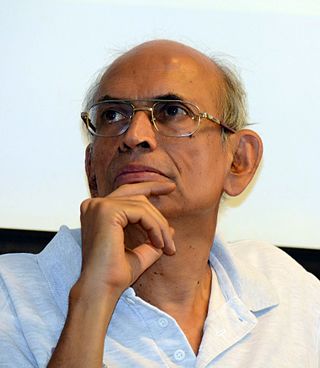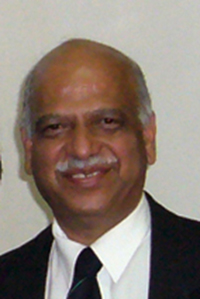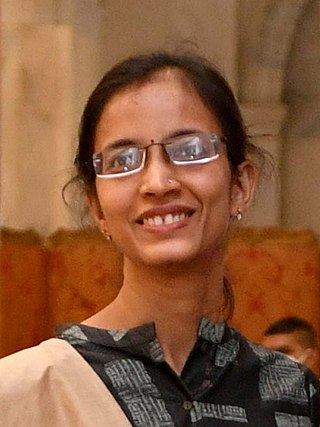
Shivaji University, established in 1962, is a state university located at Kolhapur, Maharashtra, India. The university, with a campus spread over 853 acres (345 ha), is named after Chhatrapati Shivaji Maharaj, founder of the Maratha Empire. It was inaugurated on 18 November 1962 by Sarvepalli Radhakrishnan, the then president of India. Yashwantrao Chavan and Balasaheb Desai took the lead in establishing this university. One of the major objectives behind its foundation was to cater to the educational needs of South Maharashtra region. The University's efforts towards excellence are being recognised by the substantial grants received from funding agencies such as University Grants Commission (India), Department of Science and Technology (India).

Anil Kakodkar, is an Indian nuclear physicist and mechanical engineer. He was the chairman of the Atomic Energy Commission of India and the Secretary to the Government of India, he was the Director of the Bhabha Atomic Research Centre, Trombay from 1996 to 2000. He was awarded the Padma Vibhushan, India's second highest civilian honour, on 26 January 2009.

MIT World Peace University (MIT-WPU) is a private located in Kothrud, Pune, India. It is a part of the MIT Group of Institutions.

Sree Chitra Tirunal Institute for Medical Sciences and Technology (SCTIMST), formerly Sree Chitra Tirunal Medical Center, is an autonomous medical school and an Institute of National Importance in India established in 1976 at Thiruvananthapuram, Kerala. The institute is named after Chithira Tirunal Balarama Varma, the last Maharajah of Travancore, who gifted the building. The institute is under the Administrative Control of the Department of Science and Technology, Government of India. SCTIMST is one of the most prominent research Institutes and centers in India.

Madhav Dhananjaya Gadgil is an Indian ecologist, academic, writer, columnist and the founder of the Centre for Ecological Sciences, a research forum under the aegis of the Indian Institute of Science. He is a former member of the Scientific Advisory Council to the Prime Minister of India and the Head of the Western Ghats Ecology Expert Panel (WGEEP) of 2010, popularly known as the Gadgil Commission.

Thirumalachari Ramasami is a former Indian Science and Technology Secretary. He assumed charge in May 2006. Prior to this assignment, he served as the Director of the Central Leather Research Institute, Chennai, India. He is a distinguished researcher and leather scientist. He was awarded India's National Civilian Honour the Padma Shri for excellence in Science and Engineering in 2001 and the Padma Bhushan in 2014. He was awarded the Shanti Swarup Bhatnagar Award, the highest award for science in India, for notable and outstanding research in Chemical Sciences in 1993.

The Department of Science and Technology (DST) is a department within the Ministry of Science and Technology in India. It was established in May 1971 to promote new areas of science and technology and to play the role of a nodal department for organising, coordinating and promoting Scientific and Technological activities in the country. It gives funds to various approved scientific projects in India. It also supports various researchers in India to attend conferences abroad and to go for experimental works.

Shridhar Ramachandra Gadre is an Indian scientist working in computational quantum and theoretical chemistry.

Kurukshetra University, Kurukshetra (KUK) is a university established on 11 January 1956 in Kurukshetra, in the Indian state of Haryana, 160 kilometres (99 mi) from the capital, Delhi. It is a member of Association of Commonwealth Universities.

Birla Institute of Technology and Science, Pilani – Hyderabad Campus is a private deemed university campus located in Hyderabad, India. It is one of the four constituent campuses of the BITS Pilani. BITS Pilani opened its campus in Hyderabad upon invitation by the Government of Andhra Pradesh in 2008 with the first batch of campus graduating in 2012. It is a technical and research institute with focus on Engineering and Sciences.

Vinod K. Singh is a Rahula and Namita Gautam Chair Professor of Chemistry at IIT Kanpur. He is also Director's Chair Professor at IISER Bhopal & adjunct Professor at NIPER Hyderabad. He is currently the President, Chemical Research Society of India and the Chairman, Governing Council of IACS Kolkata.

Institute of Chemical Technology (ICT) is a public state university in Mumbai, India. The institute also has campuses at Bhubaneswar, Odisha and Jalna, Marathwada. It is focused on training and research in the fields of chemical engineering, chemical technology, and pharmacy. It was established in 1933 and was granted deemed university status in 2008, making it the only state-funded deemed university in India. On 12 February 2018 it was given the status of Category 1 institute with graded autonomy by the Ministry of Human Resource Development and the University Grants Commission (India). It is also an institute with a special status as mentioned in SECTION IV of the Report of the Empowered Expert Committee in 2018.

Kapil Hari Paranjape is an Indian mathematician specializing in algebraic geometry. He is a Professor of Mathematics at the Indian Institute of Science Education and Research, Mohali.
Krishnendu Sengupta, is a professor of theoretical physics in Indian Association for the Cultivation of Science (IACS), Kolkata, India, who was awarded the Shanti Swarup Bhatnagar Prize for science and technology, the highest science award in India, for the year 2012 in physical science category. Before joining IACS he was a research fellow in Harish Chandra Research Institute, Allahabad, and associate professor in Saha Institute of Nuclear Physics, Kolkata. He received his PhD from University of Maryland at College Park and MSc degree from Indian Institute of Technology, Kharagpur.

Indian Association for the Cultivation of Science (IACS) is a public, deemed, research university for higher education and research in basic sciences under the Department of Science & Technology, Government of India. Established in 29 July 1876 by Mahendralal Sarkar, a private medical practitioner, it focuses on fundamental research in basic sciences. It is Asia's oldest research institute located at Jadavpur, South Kolkata near Jadavpur University, Central Glass and Ceramic Research Institute and Indian Institute of Chemical Biology. It is spread over a limited area of 9.5 acres and currently in the process of building an advanced SMART campus at Baruipur.
Shankar Purushottam Agharkar was an Indian Morphologist. Agharkar obtained his PhD degree (1919) from the University of Berlin, Germany. His specialization was in Plant Morphology. He was the Ghosh Professor of Botany (1920–47) at the University of Calcutta; and Founder Director (1946–60) of Maharashtra Association for the Cultivation of Science. He is one of the leading botanists of India. He explored biodiversity of Western Ghats where he came across a species of freshwater jellyfish, which was until then only known to be found in Africa. These findings were published in scientific journal Nature in 1912. Dr. Annandale, the Superintendent of the Indian Museum in Kolkata, helped Dr. Agharkar in his further endeavours to collect, preserve and conduct microscopic examinations of animal and plant specimens. The institute ARI, Pune has been named after his name.
Atmaram Bhairav Joshi was an Indian agricultural scientist and academic, known for his contributions to the field of wheat and other crop breeding. He was the vice-chancellor of Mahatma Phule Krishi Viswavidyalaya, Rahuri and the chairman of the Research Advisory Committee of the Indian Agricultural Research Institute, New Delhi. The Government of India awarded him the fourth highest Indian civilian award of Padma Shri in 1975.

Neena Gupta is a professor at the Statistics and Mathematics Unit of the Indian Statistical Institute (ISI), Kolkata. Her primary fields of interest are commutative algebra and affine algebraic geometry.

Santanu Bhattacharya is an Indian chemical biologist and a professor at the Indian Institute of Science. He is known for his studies of unnatural amino acids, oligopeptides, designed and natural lipids and biologically active natural products and is an elected fellow of the Indian National Science Academy The World Academy of Sciences and the Indian Academy of Sciences The Council of Scientific and Industrial Research, the apex agency of the Government of India for scientific research, awarded him the Shanti Swarup Bhatnagar Prize for Science and Technology, one of the highest Indian science awards, in 2003, for his contributions to chemical sciences. He is also a recipient of the National Bioscience Award for Career Development of the Department of Biotechnology (2002) and the TWAS Prize (2010).
Kanishka Biswas is an Associate Professor in the New Chemistry Unit at Jawaharlal Nehru Centre for Advanced Scientific Research, Bangalore with research interests focused on renewable energy and clean environment. The areas in which he has worked include solid state inorganic chemistry of metal chalcogenides, thermoelectric materials, 2D layered materials, topological insulators.



















